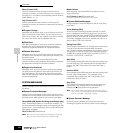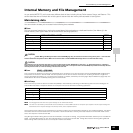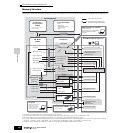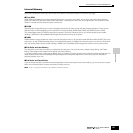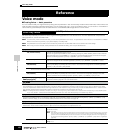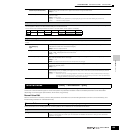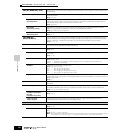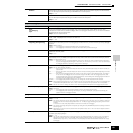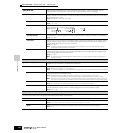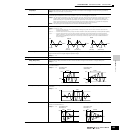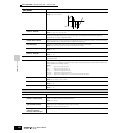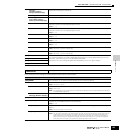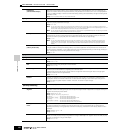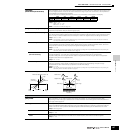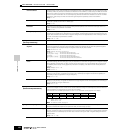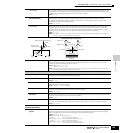
Reference Voice Mode
Voice Edit mode Normal Voice Edit Common Edit
192
Owner’s Manual
[SF3] PLAY FX
These Play Effect parameters let you control the playback of the Arpeggio in useful and interesting ways. By
changing the timing and velocity of the notes, you can change the rhythmic “feel” of the Arpeggio.
UnitMultiply (Unit Multiply) Adjust the Arpeggio playback time. For example, if you set a value of 200%, the playback time will be doubled
(tempo is halved). On the other hand, if you set a value of 50%, the playback time will be halved (tempo is doubled).
Normal playback time is 100%.
Settings: 50%, 66%, 75%, 100%, 133%, 150%, 200%
Swing Delays notes on even-numbered beats (backbeats) to produce a swing feel.
Settings: -120 ~ +120
QuntValue (Quantize Value) Determines to what beats the note data in the Arpeggio sequence data will be aligned, or determines to what beats
in the Arpeggio sequence data the swing is applied.
Settings:
QuntStrength
(Quantize Strength)
The Strength value sets the “strength” by which note events are pulled toward the nearest quantize beats. A setting
of 100% produces exact timing set via the QuntValue parameter above. A setting of 0% results in no quantization.
Settings: 0% ~ 100%
VelocityRate Determines how much the Velocity of the Arpeggio playback is offset from the original value. For example, a setting
of 100% means the original values are used. Settings below 100% will reduce the velocity of the Arpeggio notes,
whereas settings above 100% will increase the velocities.
Settings: 0% ~ 200%
n The Velocity cannot be decreased or increased beyond its normal range of 1 to 127; any values outside that range will
automatically be limited to the minimum or maximum.
GateTimeRate Determines how much the Gate Time (length) of the Arpeggio notes is offset from the original value. A setting of
100% means the original values are used. Settings below 100% will shorten the gate times of the Arpeggio notes,
whereas settings above 100% will lengthen them.
Settings: 0% ~ 200%
n The Gate Time cannot be decreased beyond its normal minimum of 1; any values outside that range will automatically be
limited to the minimum.
[F4] CTL SET (Controller Set)
[SF1] SET1/2 - [SF3] SET5/6
Since up to six Controller Sets can be assigned to each Voice, three pages (Sets 1/2, Sets 3/4 and Sets 5/6) are
provided. For more information on Controller Sets, see page 155.
ElementSw Determines whether or not the selected controller affects each individual Element.
Settings: Elements 1 to 4 enabled (“1” to “4”) or disabled (“-”)
n This parameter is disabled when the Dest (Destination) described below is set to a parameter unrelated to the Voice Elements.
Source Determines which panel controller is to be assigned and used for the selected Set. This controller then is used to
control the parameter set in Destination below.
Settings: PB (Pitch Bend Wheel), MW (Modulation Wheel), AT (After Touch), FC1 (Foot Controller 1), FS (Footswitch),
RB (Ribbon Controller), BC (Breath Controller), AS1 (Knob ASSIGN 1), AS2 (Knob ASSIGN 2), FC2 (Foot Controller2)
n
Keep in mind that unlike the other controllers, the ASSIGN A and B knobs can each be assigned to one common function for the
entire system of this synthesizer, and not to different functions for each individual voice. Also refer to the Utility mode (page 263).
Dest (Destination) Determines the parameter that is controlled by the Source controller (above).
Settings: For a complete list of the available parameters/controls, refer to the separate Data List booklet.
Depth Determines the degree to which the Source controller affects the Destination parameter. For negative values, the
controller operation is reversed; maximum controller settings produce minimum parameter changes.
Settings: -64 ~ 0 ~+63
[F5] LFO (Low Frequency Oscillator)
From these displays, you can make a variety of LFO related settings. As its name suggests, the LFO creates waveforms of a low frequency. These waveforms can
be used to vary the pitch, filter or amplitude to create effects such as vibrato, wah and tremolo.
[SF1] WAVE
Wave Determines the LFO Wave.
Settings: tri, tri+, sawup, sawdwn, squ1/4, squ1/3, squ, squ2/3, squ3/4, trpzp, S/H 1, S/H 2, user
Speed Determines the speed of the LFO Wave modulation. Higher values result in faster modulation speeds.
Settings: 0 ~ 63
32nd note
16th note triplet
16th note
1/4 note8th note triplet
8th note
1/4 note triplet



